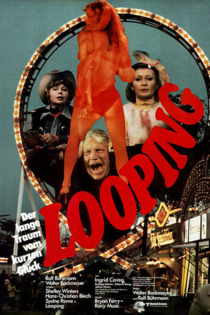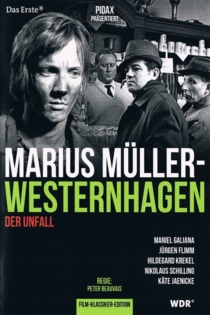
Jürgen Flimm
1941 (84 года)Otello
Jürgen Flimm
Christian Franz, Emily Magee
One of the chief pleasures of this live production of Otello from the Berlin Staatsoper Unter den Linden is Daniel Barenboim's conducting. From the opening gale-force blast of storm music, through the crunching and stabbing accompaniment of Iago's "Credo" to the shimmering strings of Desdemona's "Willow Song", he doesn't miss a trick. Everything works at the highest pitch of intensity and the orchestra sticks to his beat like glue. It's a necessary compensation for the shortcomings of the staging: the stolid chorus remains unperturbed by the storm and is directed to perform with unison movements; the acting (apart from Valeri Alexejev) is non-committal, and Alexandre Tarta's video direction somewhat flat-footed. She doesn't manage to make much small-screen sense of an impenetrably murky opening scene, for example, and doesn't seem fond of reaction shots.
Otello
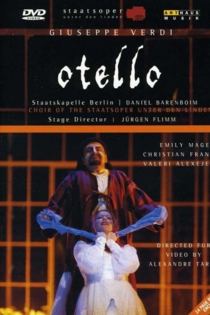
Don Giovanni
Brian Large, Jürgen Flimm
Rodney Gilfry, László Polgár
Live 2001 production from the Zurich Opera House of the classic Mozart/Da Ponte opera, with Nikolaus Harnoncourt conducting and directed for television and video by Brian Large.
Mozart: Don Giovanni (Zurich Opera House)
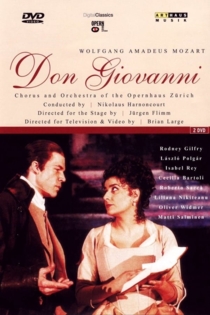
Wer zu spät kommt – Das Politbüro erlebt die deutsche Revolution
Jürgen Flimm
Hans Christian Blech, Christoph Bantzer
The TV documentation reconstructs the incidents between May and November 1989 from the point of view of the Politburo of the GDR (German Democratic Republic). The incidents include the fraud of local elections, the opening of Hungary's borders towards Austria, the ensuing tide of East German refugees to Hungary and Czechoslovakia for transfer to West Germany, the pompous ceremonies at GDR's 40th anniversary, the inept transactions the Politburo took to salvage the situation, the resulting dismissal of their leader Erich Honecker, the international press conference in East Berlin on 9th November 1989, at which Politburo member Günther Schabowski erroneously announced the immediate opening of the 'Iron Curtain', which finally led to the collapse of socialism in the GDR and the other East Bloc countries.
Wer zu spät kommt – Das Politbüro erlebt die deutsche Revolution

Angels of Iron
Thomas Brasch
Hilmar Thate, Katharina Thalbach
The subject of this historical drama is a splintering Berlin in the years of 1948 and 1949. Played against the backdrop of social upheaval, the characters in the drama come to epitomize the best and worst of each pole of the political sphere. A 17-year-old hoodlum by the name of Gladow works hand-in-glove with a local white-collar criminal to rob and pillage every day and night, defying capture. While he and his gang of thugs are terrorizing the people of Berlin, the Soviets are trying to make the blockade of their region of control impermeable. The future casts long shadows over the drama, as Berlin's problems take the shape of times to come.
Angels of Iron

Der Passagier - Welcome to Germany
Thomas Brasch
Tony Curtis, Katharina Thalbach
An American filmmaker travels to modern day Berlin to make a film based on a real-life incident from 1942 in which 13 Jewish prisoners from a concentration camp were promised freedom if they appeared in a German propaganda film. Unfortunately, the Germans lied. The psychological process undergone by the modern filmmaker while shooting the story provides the basis of this arty and challenging film.
The Passenger – Welcome to Germany
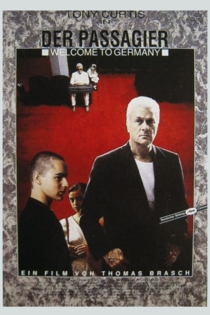
Hai-Alarm am Müggelsee
Sven Regener, Leander Haußmann
Henry Hübchen, Michael Gwisdek
A lifeguard at Lake Müggel has his hand bitten off and the marks indicate a shark attack. The lake is closed to the public by extending a local festival indefinitely while the city council thinks of what can be done to remove the shark. The public becomes restless having their lake closed for so long and come up with a plan to drive the shark from the lake with large quantities of beer.
Shark Alarm at Müggel Lake
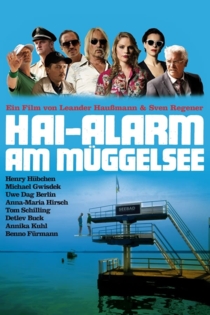
Looping
Rolf Bührmann, Walter Bockmayer
Shelley Winters, Hans Christian Blech
A small carnival is in dire financial straits. Their show is attracting fewer and fewer paying customers, as their "attractions" are ageing, out of shape and beset by internal feuds and bickering. One day a beautiful young woman shows up and suggests a way of attracting customers: put on a strip show, with her as the main attraction. Her act attracts customers in droves, but it turns out that the girl has her own agenda, and it isn't to help out the carnival.
Looping
